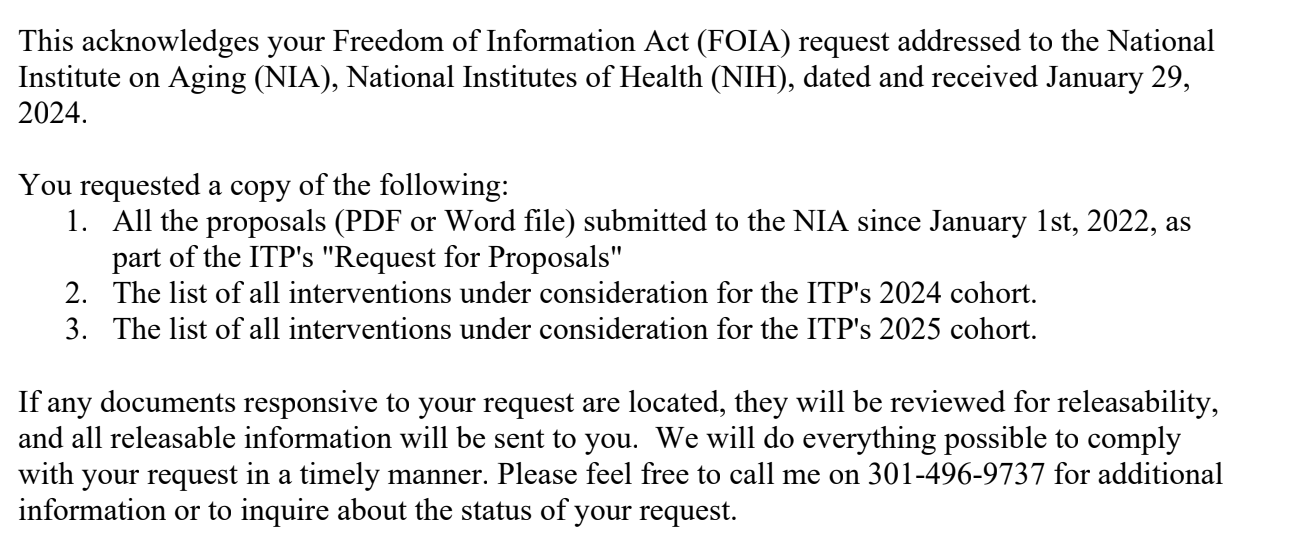I think you can look at it from different levels, and the causes in one level will be the effects in another level. It’s all interconnected.
I see that AKG is in the 2020 and then they are doing another cohort in 2022 - has that generally meant that there was a signal the first time?
Has anyone seen or heard anything about the 2020 cohort data - especially on AKG, but more in general too?
That’s also my assumption. The trials are not double blinded I guess so they can see early if one intervention is super successful. Same for CANA and STS in 2020 btw.
Does anyone know when the deadline to submit an application is? And is it really worth applying? I assume that they already have in mind the compounds I’m interested in (taurine, GlyNAC, oral semaglutide, empagliflozin, sotagliflozin, selegiline, fenofibrate, rapa + CANA) so applying might be useless…
Application Instructions
The submission deadline occurs once per year on the last weekday in February.
The next deadline is Wednesday, Feb. 28, 2024.
Is it worth applying? Hard to tell, right? Sadly they really don’t share much information on the applications - past or present, unless chosen… It would be nice to know what had been submitted in the past and turned down, every year.
But - they start sharing information, pro and con, on the chosen compounds when they are about half way through the trial…
Should I submit an FOI request? Submitting FOIA Requests | National Institutes of Health (NIH)
Just the name of the compounds submitted + the application year. And maybe as well the compounds under consideration for the next batch?
See my earlier post:
Thanks. I’ll do the FOIA request. I’ve never done it in the US but non citizens can do it and I’ve have experience of similar requests in the UK, France, and the EU (including up to the European Court of Human Rights ![]() HUDOC - European Court of Human Rights ).
HUDOC - European Court of Human Rights ).
That would be fantastic! Let us know how much work it is - and if we need to crowd-source the effort - post a message here in the forums and we can get a group together perhaps, to work on it!
It’s really easy, anyone can do it. You just email the organization and say “This is an FOIA request, I want this document”. That’s it.
Request done, I asked for:
All the proposals (PDF or Word file) submitted to the NIA since January 1st, 2022, as part of the ITP’s “Request for Proposals”,
The list of all interventions under consideration for the ITP’s 2024 cohort,
The list of all interventions under consideration for the ITP’s 2025 cohort.
The NIH’s average processing time for 2022 was:
- 52 working days for simple requests
- 215 working days for complex requests
So it’ll take time…
DNP is definitely a weird choice in hindsight ![]()
Apparently GlyNAC will be part of the next ITP cohort: Glycine+NAC vs Rapamycin - #231 by adssx
Reminder (I didn’t even know about it… Thanks @invivo for the information…), there’s also the CITP (Caenorhabditis Intervention Testing Program):
- Caenorhabditis Intervention Testing Program (CITP) | National Institute on Aging
- https://citp.squarespace.com
Might be worth applying to both the ITP and the CITP.
We’re all familiar with the ITP results, but what are the results of the CITP? Anything actionable?
Any update on the FOIA?
I wonder about finasteride, if it has ever been considered in the ITP.
Finasteride wasn’t tested, I saw similar drug (probably Dutasteride) that increased lifespan in worms by 20% - but it was only in 1 study - and not ITP
No news… I’ll post it here whenever they get back to me.
I was wondering if anyone has tried to submit it to the ITP.
I forgot this regarding FOIA:
52 working days for simple requests
215 working days for complex requests
